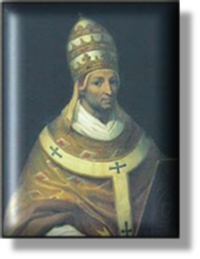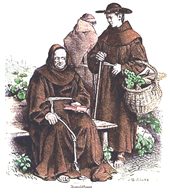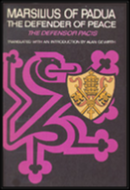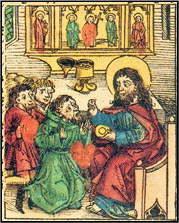


Including:
The Franciscans,
Louis IV of Bavaria,
Marsilius of Padua,
and Prester John

POPE JOHN XXII Reigned 1316 -
xxxxxJohn XXII, the second of the Avignonese popes, was the man who really established the papal court at its new location in France. He also made a determined stand in upholding the rights of the papacy in political matters. In 1322, for example, he doggedly refused to accept Louis IV of Bavaria as king of Germany, and excommunicated him two years later. In addition, from 1318 he played a prominent part in the missionary field. Under his guidance, missionaries were sent far beyond Europe. The Dominicans were assigned to Greater Armenia, Persia and India, whilst the Franciscans were sent out to northern Asia, including China. Their mission stations contributed much to the advancement of the local community. And John played a major part in preventing a rift in the Franciscan Order, resolving the matter by 1325.
 xxxxxJohn XXII is not one of the best-
xxxxxJohn XXII is not one of the best-
xxxxxHe is probably best remembered, however, for the very strong impetus he gave to the Church in the missionary field. In 1318 he looked beyond Europe, assigning areas in the Middle and Far East to specific Orders in order to avoid conflict. Greater Armenia, Persia and India were to be the missionary ground for the Dominicans, whilst the Franciscans were to concentrate their efforts in northern Asia, including China. During his period of office he established bishoprics in Armenia, Anatolia, India and Iran. At first, these mission stations were modest in number and not always successful, but, where they were tolerated, they made more headway as trade increased and European settlements and colonies were established.
Acknowledgements
John XXII: by French painter Henri Serrur (1794-
E2-
xxxxxEven before the death of St. Francis in 1226, his order, the Franciscans, founded in 1210 (JO), was in dispute over the vow of complete poverty. With the death of their great leader Bonaventure in 1274, trouble flared up between the Spirituals, those who observed the original rules, and the Conventuals who followed a less strict way of life. Pope John came down in favour of the Conventuals -
 xxxxxAt this time, the Franciscans, founded in 1210 (JO), were making a valuable contribution to the Christian cause, but their movement was not without its problems. Even before the death of St. Francis in 1226, a dispute had developed over the vow of complete poverty. The order’s rapid expansion saw the establishment of monastic houses and these, by their very nature, were unable to follow the strict laws relating to this vow. Two factions soon arose, therefore, one following the strict observance of the original rule of poverty, and another in which communal possessions were permitted.
xxxxxAt this time, the Franciscans, founded in 1210 (JO), were making a valuable contribution to the Christian cause, but their movement was not without its problems. Even before the death of St. Francis in 1226, a dispute had developed over the vow of complete poverty. The order’s rapid expansion saw the establishment of monastic houses and these, by their very nature, were unable to follow the strict laws relating to this vow. Two factions soon arose, therefore, one following the strict observance of the original rule of poverty, and another in which communal possessions were permitted.
xxxxxWith the death of their great leader Bonaventure in 1274, serious trouble flared up between these two factions, by then known as the Spirituals, the hard-
xxxxxBut Pope John’s dispute with King Louis IV of Bavaria was not so easily settled. The king, having won his battle with Frederick of Austria for the German crown, objected to Pope John’s interference in the matter. He denied papal authority in secular affairs, and came down in favour of the Franciscan Spirituals. As we shall see, this conflict between Louis IV and the Pope continued into the next reign and eventually led to the Declaration of Rhens in 1338 (E3).
xxxxxThe Italian philosopher Marsilius of Padua (c1280-
 xxxxxIn this dispute between Pope and Emperor, the Italian philosopher Marsilius of Padua (c1280-
xxxxxIn this dispute between Pope and Emperor, the Italian philosopher Marsilius of Padua (c1280-
xxxxxIt is hardly surprising that, because of this work, both he and John of Jandun were condemned as heretics by Pope John and were obliged to flee for their lives, Marsilius spending the rest of his life at the court of the Emperor Louis in Munich. Nor is it surprising that this treatise should be seen as one of  the most original pieces of political thinking for its age. Indeed, many scholars have come to regard it as precursor of both the Protestant Reformation and modern democracy.
the most original pieces of political thinking for its age. Indeed, many scholars have come to regard it as precursor of both the Protestant Reformation and modern democracy.
xxxxxIncidentally, some sources claim that Pope John sent out eight missionaries to Ethiopia in about 1314 to seek out Prester John (Presbyter John), a legendary Christian prince (illustrated), who -


